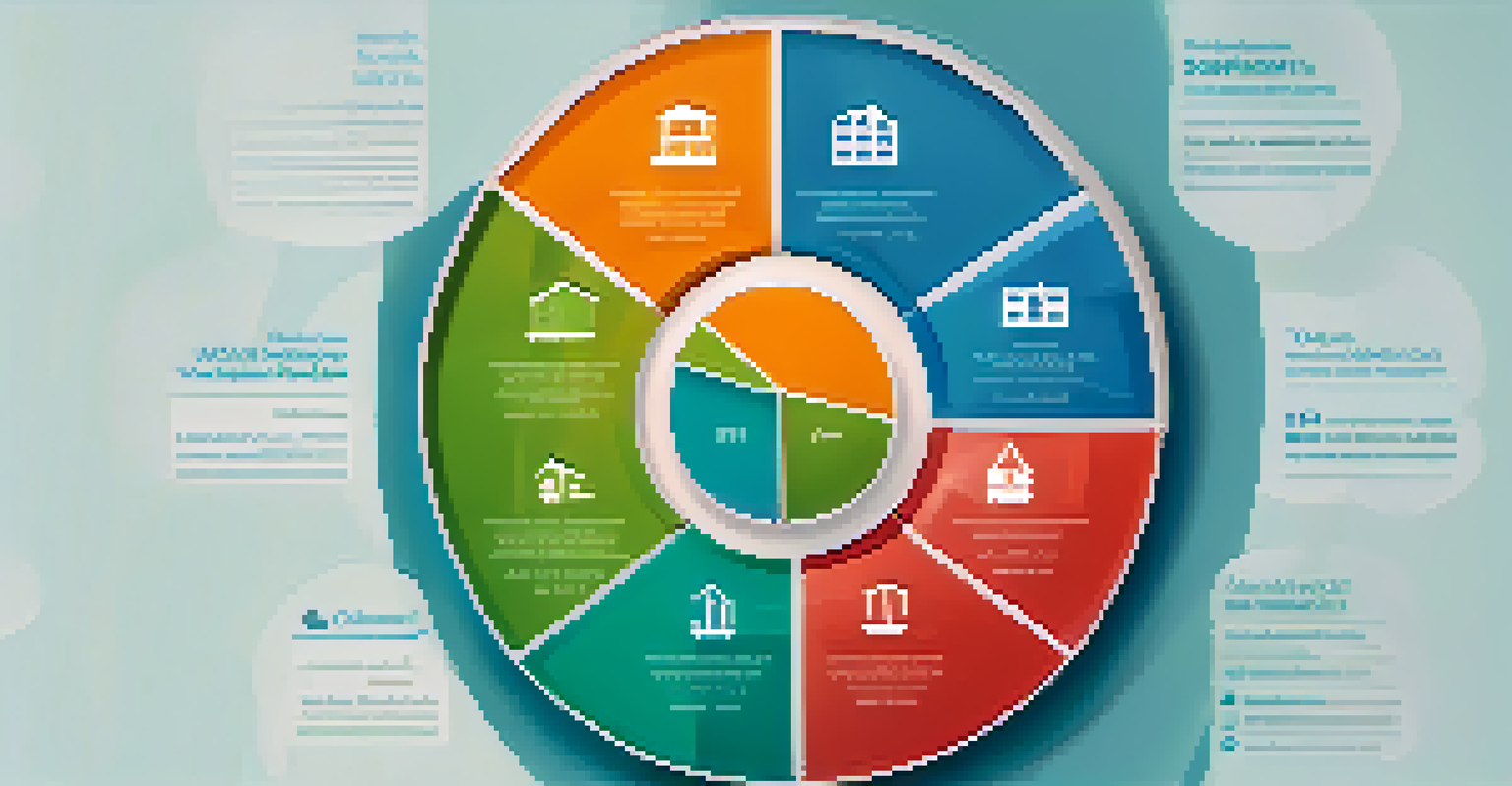Benefits of Tokenizing Real Estate Assets on Ethereum Today

Understanding Tokenization in Real Estate
Tokenization refers to the process of converting ownership of real estate assets into digital tokens on a blockchain. This allows for fractional ownership, meaning multiple investors can own a portion of a property, making real estate investment more accessible. By using Ethereum, a leading blockchain platform, these tokens can be securely traded and managed, providing transparency and efficiency.
Real estate investment is no longer just for the wealthy; tokenization is breaking down barriers and making it accessible for everyone.
Think of tokenization like slicing a pizza into individual slices. Instead of having one person own the entire pizza, multiple people can enjoy a slice, allowing for shared ownership and participation. This democratization of investment opens doors for those who may not have enough capital to buy an entire property on their own.
In essence, tokenization breaks down barriers in real estate, enabling a broader group of investors to participate in a market that was traditionally reserved for the wealthy.
Enhanced Liquidity for Investors
One of the most significant benefits of tokenizing real estate on Ethereum is enhanced liquidity. Traditional real estate transactions can take weeks or even months to complete, but tokenized assets can be bought and sold much more rapidly on various exchanges. This means investors can enter and exit their investments more easily, responding quickly to market changes.

Imagine trying to sell a house versus selling a share of stock. The stock can be sold almost instantly, while a house sale involves numerous steps and time commitments. Tokenization simplifies this process, effectively allowing real estate assets to behave more like stocks in terms of liquidity.
Fractional Ownership Revolution
Tokenization allows multiple investors to own a portion of real estate, making investments more accessible.
This increased liquidity can also lead to more accurate pricing, as the ease of trading allows the market to quickly adjust and reflect the true value of the assets.
Lower Barriers to Entry for Investors
Tokenization significantly lowers the barriers to entry for potential investors. With fractional ownership, individuals can invest in real estate with smaller amounts of capital, enabling a broader demographic to participate in the market. This is particularly beneficial for first-time investors or those looking to diversify their portfolios without committing significant funds.
The blockchain is a new technology that can bring transparency and efficiency to transactions, particularly in real estate.
Consider a scenario where you want to invest in a commercial building that costs millions of dollars. Tokenization allows you to invest a few thousand dollars instead, making the dream of owning a piece of real estate much more attainable. It's like being able to invest in a high-end fashion brand without having to buy the entire collection.
By opening up investment opportunities to more people, tokenization fosters a more inclusive real estate market.
Increased Transparency and Security
The blockchain technology underlying Ethereum offers unparalleled transparency and security. All transactions involving tokenized assets are recorded on a public ledger, ensuring that ownership records are easily verifiable and tamper-proof. This transparency builds trust among investors, who can easily track their assets' performance.
Imagine a world where you can see the entire history of a property’s ownership and transactions, akin to a detailed resume. This level of clarity not only helps investors make informed decisions but also protects against fraud, as any attempt to manipulate ownership records would be instantly detectable.
Enhanced Liquidity Benefits
Tokenized real estate can be bought and sold quickly, allowing investors to respond to market changes efficiently.
In a traditional market, disputes over ownership can lead to lengthy legal battles. With tokenization, the blockchain mitigates these issues by providing clear and accessible records.
Cost Efficiency in Transactions
Tokenizing real estate can lead to significant cost savings in transactions. Traditional real estate dealings often involve agents, legal fees, and various middlemen, which can eat away at profits. By utilizing smart contracts on the Ethereum blockchain, many of these costs can be reduced or eliminated, making transactions more cost-effective.
Think of it as cutting out the middleman in a business deal. When you streamline the process and rely on technology to handle agreements, you save both time and money. This efficiency can make real estate investment more attractive, especially for smaller investors who are sensitive to costs.
Ultimately, these savings can translate into higher returns for investors, making tokenized real estate an appealing option.
Global Reach and Market Opportunities
Tokenization of real estate on Ethereum opens up global investment opportunities. Investors can easily buy tokens from properties located anywhere in the world, breaking down geographical barriers that have traditionally limited real estate investments. This global reach allows individuals to diversify their portfolios by investing in foreign markets.
Picture being able to invest in a luxury apartment in Paris from your living room in New York. The ability to access international properties expands the potential for growth and diversification, similar to how a mutual fund exposes investors to a variety of assets.
Global Investment Opportunities
Tokenization breaks down geographical barriers, enabling investors to easily access properties worldwide.
With tokenization, the world is truly your oyster, providing a wider array of investment options than ever before.
The Future of Real Estate Investment
As technology continues to evolve, the future of real estate investment looks bright with tokenization. The benefits of enhanced liquidity, lower barriers to entry, and increased transparency are just the beginning. As more investors and institutions recognize these advantages, we may see a significant shift in how real estate is bought, sold, and managed.
Think of it like the transition from CDs to streaming music; once the advantages become clear, adoption follows quickly. Tokenization is poised to revolutionize the landscape of real estate investment, making it more accessible and efficient for everyone involved.

This shift not only benefits investors but also creates opportunities for property owners and developers, who can tap into new sources of capital to fund their projects.